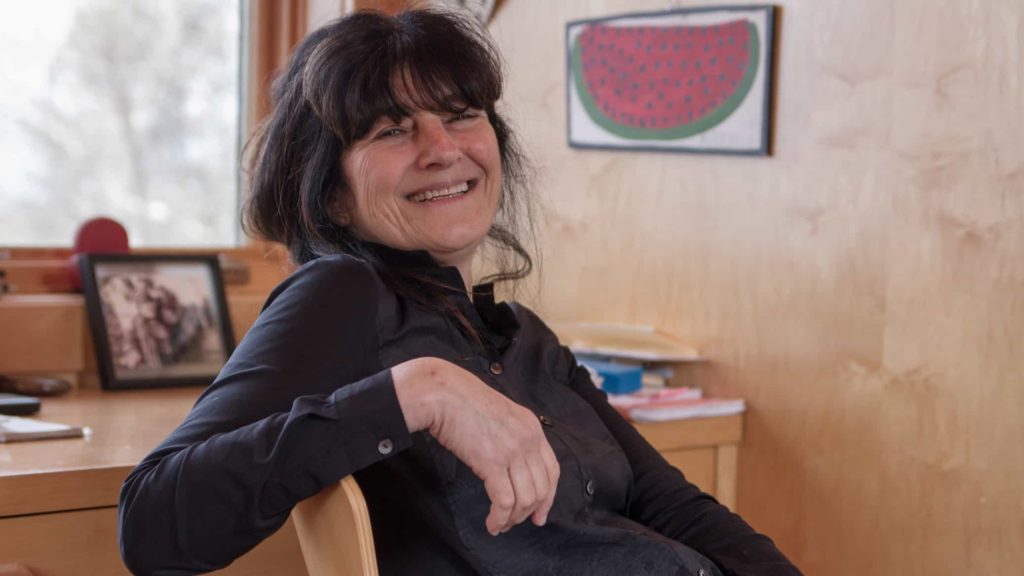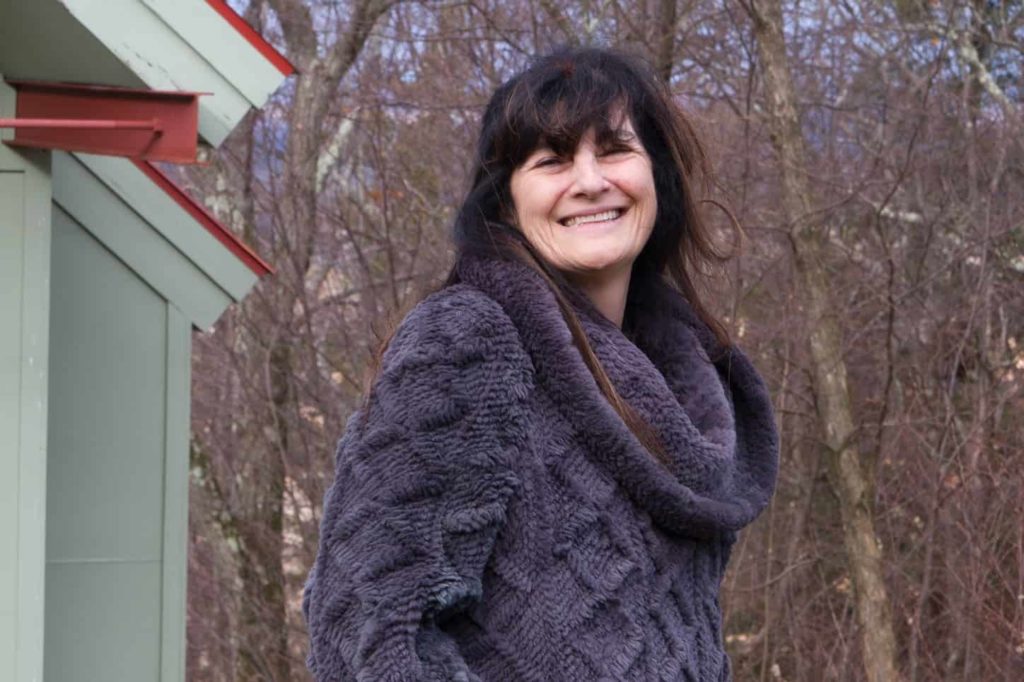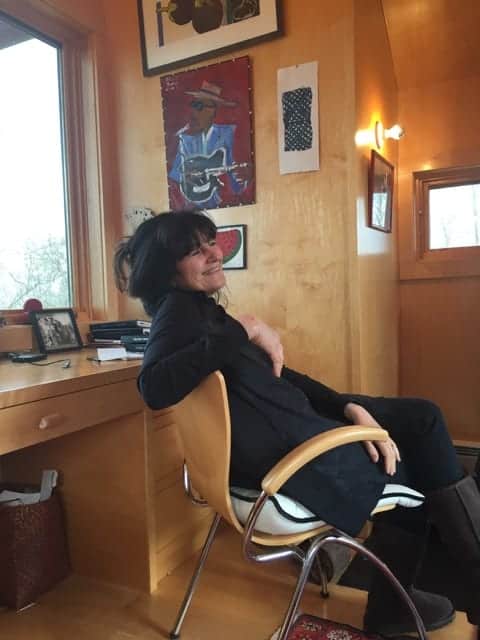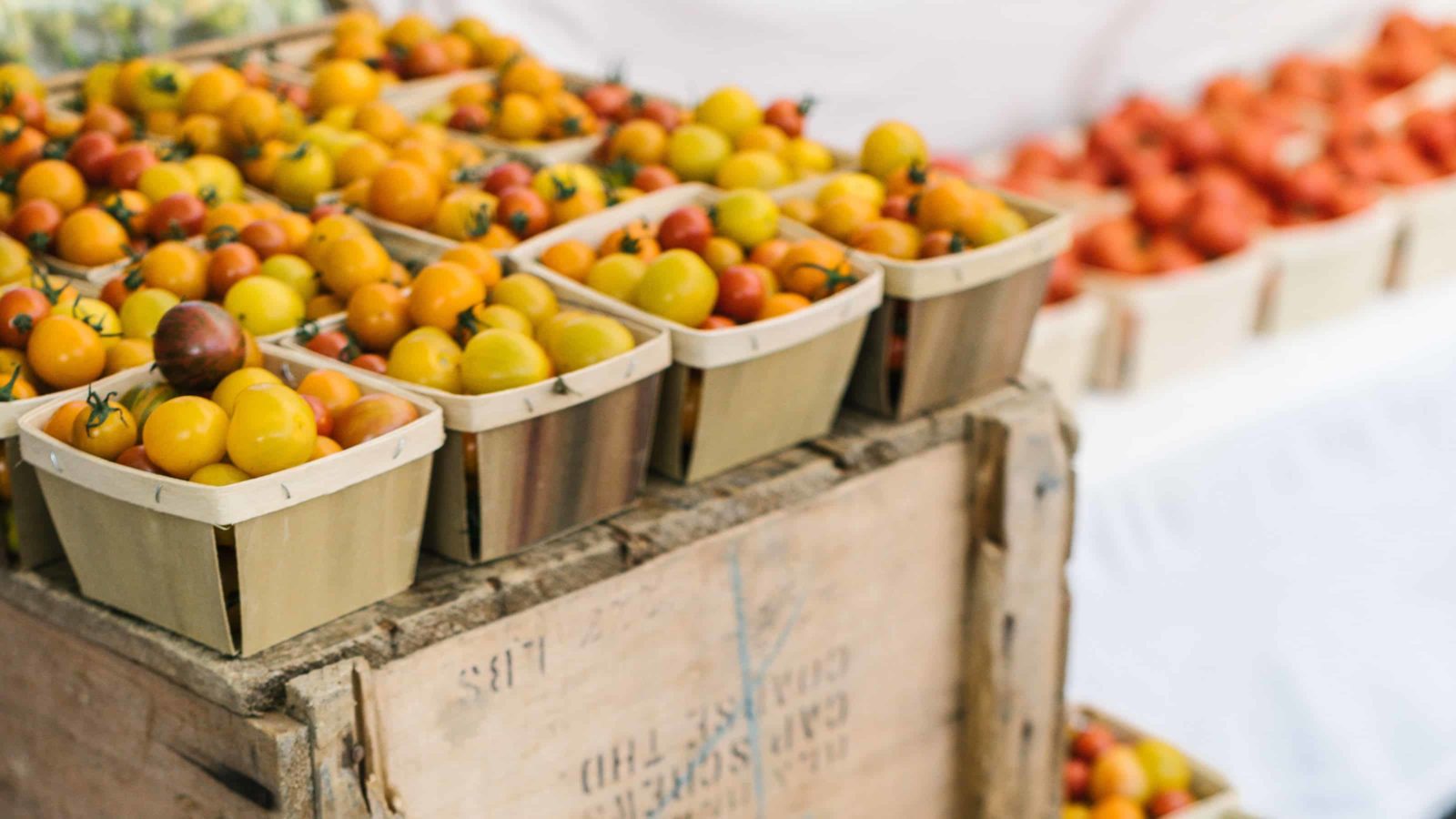Ruth Reichl flew back from Frankfurt, Germany, from a short-notice weekend trip to look for the kind of food only locals know about. Jet-lagged on a raw December day, she came back to the mountains.
When she drove up the dirt road to her house in Spencertown, N.Y., she found her husband, Michael, in the kitchen overlooking the Catskills, making Coq au Vin. She walked in to the rich aroma of chicken braised in wine.
The next morning she got up early and made him a gingered apple sauce cake. She has regularly made breakfast for her husband and her son, she said, through her years as editor-in-chief at Gourmet Magazine and restaurant critic for the New York Times and the Los Angeles Times.
In Reichl’s family, cooking is generous, and it is healing.
She held on to it in a hard year. In October 2009, without warning, Condé Nast closed Gourmet. Reichl had led the magazine for 10 years.
“It was over,” she writes in her newly released memoir and cookbook, “My Kitchen Year.” “America’s first epicurean magazine had survived for almost seventy years, and it had closed on my watch.”
In short, vivid sketches she re-lives the first shock at the Gourmet office — people holding onto each other and opening the drinks editor’s wine and coming together to her place in the city, not willing to let go. She resumes a jarring book tour and fills her house with people at Thanksgiving. And then she wakes on the first grey fall day at home without structure or purpose.
In this grieving time, she walks into the kitchen.
She begins to cook and to Tweet, and she goes on into the winter and early spring — “Thunder rumbling. Bitter broccoli rabe: sweetened with garlic, softened in olive oil, heaped on crisped bread. Just right.”

Ruth Reichl relaxes at her desk. Photo courtesy of Berkshire Festival of Women Writers.
In April of 2010, she began the new book. As former Gourmet colleagues reunited at a Chinese restaurant in the city, Bill Sertl, the former travel editor, asked Reichl, “when was the last time you didn’t have an expense account?”
She told him: 1978. He said she must miss all those fancy restaurants — and she realized she had not thought about them in months. She had taken that much pleasure in cooking at home.
She has talked for years about coaxing people back into their own kitchens, she said. The idea for the book came to her as an invitation — the story of that hard year with Tweets like Haiku and recipes like conversations: “Not a shopping list or a proscription; as though we’re standing in the kitchen together.”
“I thought of it as a book of hours,” she said, “a book people will take to bed and read at night.”
She wanted to draw people in.
“I feel like what we’ve done — food media has made you feel, if you can’t cook at chef level, don’t bother,” she said. “For me, cooking is about the journey. We’ve made it a performative act” that has to have an impressive result. “But we learn by mistakes. If it doesn’t work, big deal.”
Cooking can be putting blue cheese and pears together on a plate or breathing in the scent of spices.
“We’ve made cooking seem like a test,” she said — “It’s an adventure. If you’ve had a good time, you’ve won.”
So among recipes for holiday dishes she brings comfort food like bulgogi (Korean grilled beef) and pancakes and even a sandwich with crunchy natural peanut butter and strawberry jam.
PB&J “is one of our greatest inventions,” she said.
Cooking is a game, a meditation and a gift: Offering something fresh out of the oven or out of the garden has power. The first issue of Gourmet she put together, she said, had a W. Eugene Smith photograph of a middle-aged French peasant woman with a radiant smile holding out both hands full of truffles. Reichl wanted that woman on the cover.
“That is cooking,” she said. “It’s sharing. When everyone’s nerves are jangled, you put on a pot of chicken soup and everyone will feel better. People feel loved when you cook for them. They feel cared for.”
“My Kitchen Year” has taken time in the making.
In the spring of 2010, Reichl began to write her first novel, “Delicious!” — following a young woman from Southern California to a food magazine in New York and through the magazine’s closing, and into a chocolatier where the dark chocolate tastes like the air before rain and a cheese shop where the spring parmesan tastes like young grass.

Ruth Reichl looks out at the view from her house and writing studio in Columbia County. Photo courtesy of Berkshire Festival of Women Writers.
She struggled with the novel, she said. Then Michael got sick and went through several operations, and she cared for him. But all that time she thought of the memoir.
“It was there,” she said. “When I sat down I just wrote it, and it’s not much edited.”
She thought of it as a simple small book, but her editor insisted on photographs. So Reichl talked with Richard Ferretti, her former creative director at Gourmet, and he recommended photographer Mikkel Vang. Vang agreed with her intimate vision.
“He said ‘it will be just you and me,” she said, “no lights, no assistant, no stylist. These are honest recipes, and I want honest photos. You’ll cook, and we’ll take it out of the oven, and we’ll find a plate from the cupboard and shoot it and eat it.”
Her kitchen is an island of counters and copper pots in a long, light living room. Reichl and Vang set plates by the sunny window, and Reichl would hold the NAMA Cookbook to bounce light or block it.
Then Vang ranged outside. He had contracted for images of food, she said, and no one had asked him to add the woods or the two chairs at the edge of the lawn. But by the time he walked in on the first day he had taken more than 100 photographs. Images of the country and the city draw the story together in its unique form, memoir and cookbook together.
Reichl had already written an early cookbook and four memoirs: “Tender at the Bone,” “Comfort Me with Apples,” “Garlic and Sapphires” and “For You, Mom, Finally.” She kept writing deliberately in her time at Gourmet, she said. She didn’t want Condé Nast to think they owned her.
Condé Nast “wraps you up in luxury,” she said. “I think Si [Newhouse] wants to make it impossible for people to leave. It’s important to maintain independence. Writing is about being an independent person — self-sufficient.”
For her, being an editor has also meant independence and integrity. Reichl brought to Gourmet a constant awareness of eating as an ethical act. She made that decision consciously from the beginning, she said. When she interviewed with Condé Nast, she told then editorial director James Truman that the magazine was missing an opportunity — focusing on luxury and indulgence when the world of food was changing.
She remembered his response: “I came here looking for an elegant dinner party, and you’ve convinced me I should be looking for much more.”

Ruth Reichl relaxes at her desk. Photo courtesy of Berkshire Festival of Women Writers.
Reichl has seen sweeping food movements in this country, close up. She was in Berkeley when chef Alice Waters co-founded Chez Panisse in the 1970s, focusing on local, organic food, and in L.A. as the food movement grew in California.
“Julia Child told us about technique,” she said. “She told us we could cook great food out of the supermarket. My generation said no, it’s all about the ingredients.”
As she came to New York, the U.S. began to wake up to farmers markets and the consequences of eating.
“I think the next big change was a long leap, beginning to understand our food system was in deep trouble,” she said. “In 2006 or 2007 I gave a speech to newspaper editorial writers begging them to pay attention to food. You couldn’t give that speech now, because everybody does.”
Gourmet in her time has influenced the national conversation about food, she said, covering small family farms, the scarcity of slaughter houses, fish farming and the devastation of oceans.
She looked back with pride at Barry Estabrook’s March 2009 story on people who worked the tomato fields of Immokalee, Florida, in conditions of slavery — some living in shacks without plumbing, beaten and denied the scant wages they earned. The Coalition of Immokalee Workers had been fighting for attention since 1993 and getting little until Gourmet followed the story.
“This was shocking to people,” Reichl said, “that they were eating tomatoes picked by slaves.”
David Foster Wallace turned a trip to a Maine lobster festival in 2003 into a close look at the way lobsters feel pain and a serious question: Is it right to boil them alive?
“If you’re going to eat animals, you should know how they’re killed,” Reichl said.
She faced this question squarely in her second issue, in a profile of chef Thomas Keller, and she agonized over this story as a brand new editor.
In that piece Keller decided that if he wanted to serve meat he should know how to kill it, she said, and he tried to butcher a rabbit without knowing how. The scene was graphic, and the rabbit bled and screamed. The publisher tried to stop the story from running, and she fought for it. She said they had to print that scene: Keller had said this was a seminal moment in his life as a chef — he decided this would have to be the most delicious rabbit ever eaten, so that its life would not have been lost in vain.
“Food is life itself,” she said.
So she took a risk in a magazine that had always been polite. It was her first moment of ‘Oh my God, I’m going to do this,” she said. It was her first revealing time as an editor there. In good magazines, she said, the editor exposes herself in what she chooses to cover. And these are getting fewer and fewer.
Now, in a new place and in the same spirit, she has moved from the loss of the magazine into a novel and a memoir, and she has turned a dark year into a celebration of flavor and sensory detail and deep friendship. And baring that experience did not frighten her.
“It felt right,” she said.
In spring 2016, Ruth Reichl spoke at a brunch with the Berkshire Festival of Women Writers. But I got to talk with her in December 2015, in her kitchen, for the festival’s program and magazine. My thanks for Ruth for her generosity and to Jennifer Browdie for making that conversation possible.

